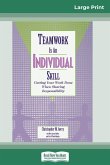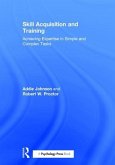Individual and Team Skill Decay
The Science and Implications for Practice
Herausgeber: Arthur, Jr. Winfred; Bennett, Jr. Winston; Day, Eric Anthony
Individual and Team Skill Decay
The Science and Implications for Practice
Herausgeber: Arthur, Jr. Winfred; Bennett, Jr. Winston; Day, Eric Anthony
- Gebundenes Buch
- Merkliste
- Auf die Merkliste
- Bewerten Bewerten
- Teilen
- Produkt teilen
- Produkterinnerung
- Produkterinnerung
Skill and knowledge retention is a major issue and concern in learning and skill acquisition, especially when trained or acquired skills (or knowledge) are needed after long periods of nonuse. The goal of this book is to summarize and advance the thinking of critical issues related to skill retention and decay in the context of individual and team training on complex tasks. This volume will be of interest to researchers and practitioners in the fields of industrial and organizational psychology, human factors, organizational behavior, and human resources management.
Andere Kunden interessierten sich auch für
![Individual and Team Skill Decay Individual and Team Skill Decay]() Individual and Team Skill Decay103,99 €
Individual and Team Skill Decay103,99 €![Teamwork Is an Individual Skill Teamwork Is an Individual Skill]() Christopher AveryTeamwork Is an Individual Skill31,99 €
Christopher AveryTeamwork Is an Individual Skill31,99 €![Visitor Attractions and Events Visitor Attractions and Events]() Adi WeidenfeldVisitor Attractions and Events206,99 €
Adi WeidenfeldVisitor Attractions and Events206,99 €![Skill Acquisition and Training Skill Acquisition and Training]() Addie JohnsonSkill Acquisition and Training236,99 €
Addie JohnsonSkill Acquisition and Training236,99 €![Reconciling Indigenous Peoples' Individual and Collective Rights Reconciling Indigenous Peoples' Individual and Collective Rights]() Jessika EichlerReconciling Indigenous Peoples' Individual and Collective Rights195,99 €
Jessika EichlerReconciling Indigenous Peoples' Individual and Collective Rights195,99 €![Universal Skill Universal Skill]() Sandeep ChavanUniversal Skill31,99 €
Sandeep ChavanUniversal Skill31,99 €![Is training Good method To Raise Salesperon Skill Is training Good method To Raise Salesperon Skill]() John LokIs training Good method To Raise Salesperon Skill14,99 €
John LokIs training Good method To Raise Salesperon Skill14,99 €-
-
-
Skill and knowledge retention is a major issue and concern in learning and skill acquisition, especially when trained or acquired skills (or knowledge) are needed after long periods of nonuse. The goal of this book is to summarize and advance the thinking of critical issues related to skill retention and decay in the context of individual and team training on complex tasks. This volume will be of interest to researchers and practitioners in the fields of industrial and organizational psychology, human factors, organizational behavior, and human resources management.
Hinweis: Dieser Artikel kann nur an eine deutsche Lieferadresse ausgeliefert werden.
Hinweis: Dieser Artikel kann nur an eine deutsche Lieferadresse ausgeliefert werden.
Produktdetails
- Produktdetails
- Verlag: Routledge
- Seitenzahl: 464
- Erscheinungstermin: 19. März 2013
- Englisch
- Abmessung: 235mm x 157mm x 29mm
- Gewicht: 817g
- ISBN-13: 9780415885782
- ISBN-10: 0415885787
- Artikelnr.: 35284927
- Herstellerkennzeichnung
- Libri GmbH
- Europaallee 1
- 36244 Bad Hersfeld
- gpsr@libri.de
- Verlag: Routledge
- Seitenzahl: 464
- Erscheinungstermin: 19. März 2013
- Englisch
- Abmessung: 235mm x 157mm x 29mm
- Gewicht: 817g
- ISBN-13: 9780415885782
- ISBN-10: 0415885787
- Artikelnr.: 35284927
- Herstellerkennzeichnung
- Libri GmbH
- Europaallee 1
- 36244 Bad Hersfeld
- gpsr@libri.de
Winfred Arthur, Jr. is Full Professor of Psychology and Management at Texas A&M University. He is a Fellow of the Society for Industrial and Organizational Psychology, the Association of Psychological Science, and the American Psychological Association. He is past Associate Editor of the Journal of Applied Psychology and currently serves on its editorial board along with Personnel Psychology, and Industrial and Organizational Psychology: Perspectives on Science and Practice as well. His research interests are in human performance; training development, design, implementation, and evaluation; team selection and training; acquisition and retention of complex skills; testing, selection, and validation; models of job performance; personnel psychology; and meta-analysis. Eric Anthony Day is an Associate Professor of Psychology at the University of Oklahoma where he is part of the Doctoral program in Industrial and Organizational Psychology. His research interests primarily fall in the traditional areas of personnel psychology and human resources management, including personnel assessment, selection, and training and development. Much of his research involves the study of complex skill acquisition with emphases on individual differences, cognitive and social processes, expert-novice differences, decay and adaptability, and team-based training. Winston "Wink" Bennett, Jr. is a Senior Research Psychologist and Technical Advisor for continuous learning and performance assessment research with the Air Force Research Laboratory Human Effectiveness Directorate in Dayton, Ohio. He is a Fellow of the Air Force Research Laboratory and is also a Fellow of the American Psychological Association. He has published over 90 research articles, textbooks, chapters, and technical reports in the Human Factors, Aviation, Industrial and Organizational Psychology literatures. Antoinette M. Portrey is a Senior Scientist with L-3 Communications Link Simulation and Training. She leads her team in warfighter training research at the Air Force Research Laboratory Human Effectiveness Directorate, Warfighter Readiness Research Division in Dayton, Ohio. Her team facilitates the research, design, development, and integration of continuous learning training methodologies and technologies to be used with interactive, multi-fidelity, immersive training environments. Specialty areas include: human performance measurement; individual, team, and unit training effectiveness; training systems assessment; and integrated learning management technologies.
Section 1: Introduction and Foundational Issues 1. Introduction Winfred Arthur
Jr.
Eric Anthony Day 2. Remembering and forgetting: From the laboratory looking out Scott D. Gronlund
Daniel R. Kimball 3. Complex command-and-control simulation task performance following periods of nonuse Anton J. Villado
Eric Anthony Day
Winfred Arthur
Jr.
Paul R. Boatman
Vanessa Kowollik
Alok Bhupatkar
Winston Bennett
Jr. 4. Factors influencing knowledge and skill decay in organizational training: A meta-analysis Xiaoqian Wang
Eric Anthony Day
Vanessa Kowollik
Matthew J. Schuelke
Michael G. Hughes 5. Variance as an indicator of training effectiveness in the context of complex skill acquisition
retention
and transfer Ira Schurig
Winfred Arthur
Jr.
Eric Anthony Day
David J. Woehr Section 2: Individual Skill Retention and Transfer on Complex Task with Extended nonuse Intervals
the Factors that Influence it
and how Skill Decay can be Mitigated 6. Improving military readiness: Evaluation and prediction of performance to optimize training effectiveness Tiffany S. Jastrzembski
Antoinette M. Portrey
Brian T. Schreiber
Kevin A. Gluck 7. Training for efficient
durable
and flexible performance in the military Alice F. Healy
Erica L. Wohldmann
James A. Kole
Vivian I. Schneider
Kathleen M. Shea
Lyle E. Bourne
Jr. 8. Complex movement sequences: How the sequence structure affects learning and transfer Charles H. Shea
Attila J. Kovacs 9. Use of
reaction to
and efficacy of observation rehearsal training: Enhancing skill retention on a complex command-and-control simulation task Anton J. Villado
Eric Anthony Day
Winfred Arthur
Jr.
Paul R. Boatman
Vanessa Kowollik
Alok Bhupatkar
Winston Bennett
Jr. 10. Skill decay
re-acquisition training and transfer studies in the Swedish Air Force: A retrospective review Erland Svensson
Maud Angelborg-Thanderz
Jonathan Borgvall
Martin Castor 11. Relating individual differences in ability
personality
and motivation to the retention and transfer of skill on a complex command-and-control simulation task Eric Anthony Day
Winfred Arthur
Jr.
Anton J. Villado
Paul R. Boatman
Vanessa Kowollik
Alok Bhupatkar
Winston Bennett
Jr. 12. Individual difference variables as predictors of error during multitasking training Elizabeth M. Poposki
Frederick L. Oswald Section 3: Skill Decay and Retention at the Team Level 13. A comparative investigation of individual and team skill retention and transfer on a complex command-and-control simulation task Winfred Arthur
Jr.
Eric Anthony Day
Anton J. Villado
Ryan M. Glaze
Matthew J. Schuelke
Paul R. Boatman
Vanessa Kowollik
Xiaoqian Wang
Winston Bennett
Jr. 14. Retention of team coordination skill Nancy J. Cooke
Jamie C. Gorman
Jasmine Duran
Christopher Myers
Dee Andrews 15. Team performance decay: Why does it happen and how to avoid it? Deborah DiazGranados
Elizabeth Lazzara
Rebecca Lyons
Samuel R. Wooten
Eduardo Salas Section 4: Summary 16. A Look aFarr (1987): The Past
Present
and Future of Applied Skill Decay Research Winfred Arthur
Jr.
Eric Anthony Day
Jr.
Eric Anthony Day 2. Remembering and forgetting: From the laboratory looking out Scott D. Gronlund
Daniel R. Kimball 3. Complex command-and-control simulation task performance following periods of nonuse Anton J. Villado
Eric Anthony Day
Winfred Arthur
Jr.
Paul R. Boatman
Vanessa Kowollik
Alok Bhupatkar
Winston Bennett
Jr. 4. Factors influencing knowledge and skill decay in organizational training: A meta-analysis Xiaoqian Wang
Eric Anthony Day
Vanessa Kowollik
Matthew J. Schuelke
Michael G. Hughes 5. Variance as an indicator of training effectiveness in the context of complex skill acquisition
retention
and transfer Ira Schurig
Winfred Arthur
Jr.
Eric Anthony Day
David J. Woehr Section 2: Individual Skill Retention and Transfer on Complex Task with Extended nonuse Intervals
the Factors that Influence it
and how Skill Decay can be Mitigated 6. Improving military readiness: Evaluation and prediction of performance to optimize training effectiveness Tiffany S. Jastrzembski
Antoinette M. Portrey
Brian T. Schreiber
Kevin A. Gluck 7. Training for efficient
durable
and flexible performance in the military Alice F. Healy
Erica L. Wohldmann
James A. Kole
Vivian I. Schneider
Kathleen M. Shea
Lyle E. Bourne
Jr. 8. Complex movement sequences: How the sequence structure affects learning and transfer Charles H. Shea
Attila J. Kovacs 9. Use of
reaction to
and efficacy of observation rehearsal training: Enhancing skill retention on a complex command-and-control simulation task Anton J. Villado
Eric Anthony Day
Winfred Arthur
Jr.
Paul R. Boatman
Vanessa Kowollik
Alok Bhupatkar
Winston Bennett
Jr. 10. Skill decay
re-acquisition training and transfer studies in the Swedish Air Force: A retrospective review Erland Svensson
Maud Angelborg-Thanderz
Jonathan Borgvall
Martin Castor 11. Relating individual differences in ability
personality
and motivation to the retention and transfer of skill on a complex command-and-control simulation task Eric Anthony Day
Winfred Arthur
Jr.
Anton J. Villado
Paul R. Boatman
Vanessa Kowollik
Alok Bhupatkar
Winston Bennett
Jr. 12. Individual difference variables as predictors of error during multitasking training Elizabeth M. Poposki
Frederick L. Oswald Section 3: Skill Decay and Retention at the Team Level 13. A comparative investigation of individual and team skill retention and transfer on a complex command-and-control simulation task Winfred Arthur
Jr.
Eric Anthony Day
Anton J. Villado
Ryan M. Glaze
Matthew J. Schuelke
Paul R. Boatman
Vanessa Kowollik
Xiaoqian Wang
Winston Bennett
Jr. 14. Retention of team coordination skill Nancy J. Cooke
Jamie C. Gorman
Jasmine Duran
Christopher Myers
Dee Andrews 15. Team performance decay: Why does it happen and how to avoid it? Deborah DiazGranados
Elizabeth Lazzara
Rebecca Lyons
Samuel R. Wooten
Eduardo Salas Section 4: Summary 16. A Look aFarr (1987): The Past
Present
and Future of Applied Skill Decay Research Winfred Arthur
Jr.
Eric Anthony Day
Section 1: Introduction and Foundational Issues 1. Introduction Winfred Arthur
Jr.
Eric Anthony Day 2. Remembering and forgetting: From the laboratory looking out Scott D. Gronlund
Daniel R. Kimball 3. Complex command-and-control simulation task performance following periods of nonuse Anton J. Villado
Eric Anthony Day
Winfred Arthur
Jr.
Paul R. Boatman
Vanessa Kowollik
Alok Bhupatkar
Winston Bennett
Jr. 4. Factors influencing knowledge and skill decay in organizational training: A meta-analysis Xiaoqian Wang
Eric Anthony Day
Vanessa Kowollik
Matthew J. Schuelke
Michael G. Hughes 5. Variance as an indicator of training effectiveness in the context of complex skill acquisition
retention
and transfer Ira Schurig
Winfred Arthur
Jr.
Eric Anthony Day
David J. Woehr Section 2: Individual Skill Retention and Transfer on Complex Task with Extended nonuse Intervals
the Factors that Influence it
and how Skill Decay can be Mitigated 6. Improving military readiness: Evaluation and prediction of performance to optimize training effectiveness Tiffany S. Jastrzembski
Antoinette M. Portrey
Brian T. Schreiber
Kevin A. Gluck 7. Training for efficient
durable
and flexible performance in the military Alice F. Healy
Erica L. Wohldmann
James A. Kole
Vivian I. Schneider
Kathleen M. Shea
Lyle E. Bourne
Jr. 8. Complex movement sequences: How the sequence structure affects learning and transfer Charles H. Shea
Attila J. Kovacs 9. Use of
reaction to
and efficacy of observation rehearsal training: Enhancing skill retention on a complex command-and-control simulation task Anton J. Villado
Eric Anthony Day
Winfred Arthur
Jr.
Paul R. Boatman
Vanessa Kowollik
Alok Bhupatkar
Winston Bennett
Jr. 10. Skill decay
re-acquisition training and transfer studies in the Swedish Air Force: A retrospective review Erland Svensson
Maud Angelborg-Thanderz
Jonathan Borgvall
Martin Castor 11. Relating individual differences in ability
personality
and motivation to the retention and transfer of skill on a complex command-and-control simulation task Eric Anthony Day
Winfred Arthur
Jr.
Anton J. Villado
Paul R. Boatman
Vanessa Kowollik
Alok Bhupatkar
Winston Bennett
Jr. 12. Individual difference variables as predictors of error during multitasking training Elizabeth M. Poposki
Frederick L. Oswald Section 3: Skill Decay and Retention at the Team Level 13. A comparative investigation of individual and team skill retention and transfer on a complex command-and-control simulation task Winfred Arthur
Jr.
Eric Anthony Day
Anton J. Villado
Ryan M. Glaze
Matthew J. Schuelke
Paul R. Boatman
Vanessa Kowollik
Xiaoqian Wang
Winston Bennett
Jr. 14. Retention of team coordination skill Nancy J. Cooke
Jamie C. Gorman
Jasmine Duran
Christopher Myers
Dee Andrews 15. Team performance decay: Why does it happen and how to avoid it? Deborah DiazGranados
Elizabeth Lazzara
Rebecca Lyons
Samuel R. Wooten
Eduardo Salas Section 4: Summary 16. A Look aFarr (1987): The Past
Present
and Future of Applied Skill Decay Research Winfred Arthur
Jr.
Eric Anthony Day
Jr.
Eric Anthony Day 2. Remembering and forgetting: From the laboratory looking out Scott D. Gronlund
Daniel R. Kimball 3. Complex command-and-control simulation task performance following periods of nonuse Anton J. Villado
Eric Anthony Day
Winfred Arthur
Jr.
Paul R. Boatman
Vanessa Kowollik
Alok Bhupatkar
Winston Bennett
Jr. 4. Factors influencing knowledge and skill decay in organizational training: A meta-analysis Xiaoqian Wang
Eric Anthony Day
Vanessa Kowollik
Matthew J. Schuelke
Michael G. Hughes 5. Variance as an indicator of training effectiveness in the context of complex skill acquisition
retention
and transfer Ira Schurig
Winfred Arthur
Jr.
Eric Anthony Day
David J. Woehr Section 2: Individual Skill Retention and Transfer on Complex Task with Extended nonuse Intervals
the Factors that Influence it
and how Skill Decay can be Mitigated 6. Improving military readiness: Evaluation and prediction of performance to optimize training effectiveness Tiffany S. Jastrzembski
Antoinette M. Portrey
Brian T. Schreiber
Kevin A. Gluck 7. Training for efficient
durable
and flexible performance in the military Alice F. Healy
Erica L. Wohldmann
James A. Kole
Vivian I. Schneider
Kathleen M. Shea
Lyle E. Bourne
Jr. 8. Complex movement sequences: How the sequence structure affects learning and transfer Charles H. Shea
Attila J. Kovacs 9. Use of
reaction to
and efficacy of observation rehearsal training: Enhancing skill retention on a complex command-and-control simulation task Anton J. Villado
Eric Anthony Day
Winfred Arthur
Jr.
Paul R. Boatman
Vanessa Kowollik
Alok Bhupatkar
Winston Bennett
Jr. 10. Skill decay
re-acquisition training and transfer studies in the Swedish Air Force: A retrospective review Erland Svensson
Maud Angelborg-Thanderz
Jonathan Borgvall
Martin Castor 11. Relating individual differences in ability
personality
and motivation to the retention and transfer of skill on a complex command-and-control simulation task Eric Anthony Day
Winfred Arthur
Jr.
Anton J. Villado
Paul R. Boatman
Vanessa Kowollik
Alok Bhupatkar
Winston Bennett
Jr. 12. Individual difference variables as predictors of error during multitasking training Elizabeth M. Poposki
Frederick L. Oswald Section 3: Skill Decay and Retention at the Team Level 13. A comparative investigation of individual and team skill retention and transfer on a complex command-and-control simulation task Winfred Arthur
Jr.
Eric Anthony Day
Anton J. Villado
Ryan M. Glaze
Matthew J. Schuelke
Paul R. Boatman
Vanessa Kowollik
Xiaoqian Wang
Winston Bennett
Jr. 14. Retention of team coordination skill Nancy J. Cooke
Jamie C. Gorman
Jasmine Duran
Christopher Myers
Dee Andrews 15. Team performance decay: Why does it happen and how to avoid it? Deborah DiazGranados
Elizabeth Lazzara
Rebecca Lyons
Samuel R. Wooten
Eduardo Salas Section 4: Summary 16. A Look aFarr (1987): The Past
Present
and Future of Applied Skill Decay Research Winfred Arthur
Jr.
Eric Anthony Day








